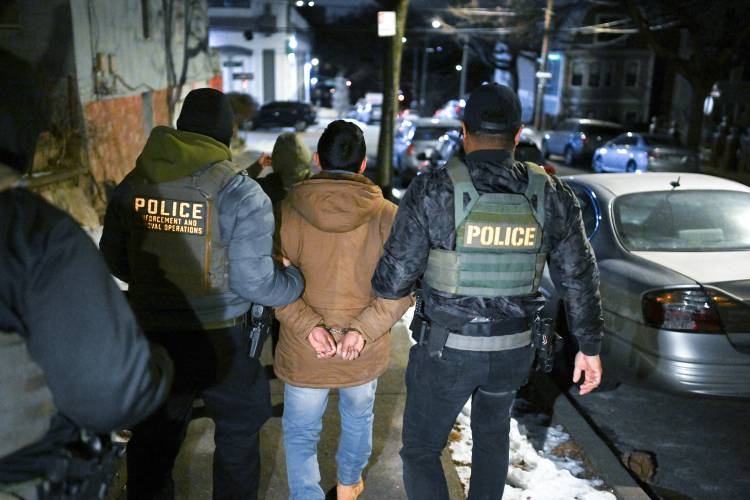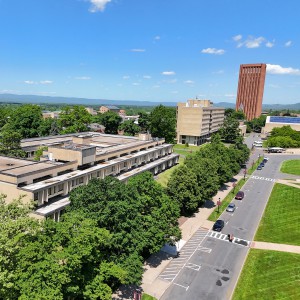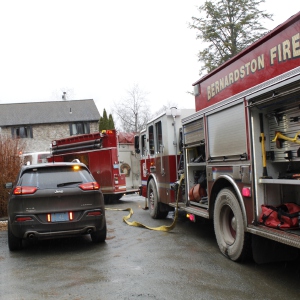Fighting back at fear: Immigrant defenders’ briefing shares knowledge, resolve

Officers walk with Leonardo Fabian Cando Juntamay as he was detained in the Bronx during ICE-led operations to apprehend illegal immigrants on Jan. 28 in New York City. The Washington Post
|
Published: 03-07-2025 4:23 PM
Modified: 03-07-2025 6:27 PM |
A virtual briefing on immigrant and refugee rights and protections hosted by state Rep. Mindy Domb and state Sen. Jo Comerford drew a crowd of more than 200 participants earlier this week.
Hoping to shine a light through the murk of confusion and fear surrounding immigration issues during the Trump administration, the briefing included voices from advocates and politicians from the Pioneer Valley and beyond. Participants heard contextualizing information from local attorneys and advocates, an introduction to three major bills being pursued at the State House to protect immigrant rights in Massachusetts, and insight from local immigration organizations on what is being done to aid new Americans — and how more people can help.
“There is nothing more powerful than an informed, engaged and active electorate. Nothing in the world,” Comerford reminded viewers throughout the briefing.
The event began with local immigration advocates setting the stage with the legal backdrop for some of the fears that have been circulating in western Massachusetts and around the nation regarding the state of immigration in the U.S.
Northampton immigration attorney Dan Berger explained some of the main legal actions that have come down from Washington that could impact local immigrant families, including an end to ICE prioritizing enforcement actions based on a person’s circumstances and record, and the passage of the Laken Riley Act, which creates mandatory detention for illegal immigrants accused of crimes as minor as shoplifting.
Amy Grunder, director of state government affairs at the Massachusetts Immigrant and Refugee Advocacy Coalition, explained that one of the ways people can stand in support of immigrant communities during these times is by supporting legislation that protects immigrant and refugee rights, and by showing municipal solidarity with their immigrant residents.
That’s something that Javier Luengo-Garrido said he and his colleagues at the ACLU of Massachusetts have been working on by pushing for the passage of “safe city” or sanctuary ordinances that affirm a municipality’s commitment to welcoming and protecting all community members and limit cooperation between local law enforcement and federal immigration enforcement.
Such ordinances have passed in Northampton, Easthampton, Greenfield, Amherst and elsewhere.
Article continues after...
Yesterday's Most Read Articles
Several of Domb and Comerford’s colleagues in the state Legislature attended the briefing to present three pieces of legislation that would help protect immigrant and refugee rights in Massachusetts throughout the Trump administration and past it.
The first piece of legislation was the Safe Communities Act (SD.1670/HD.3816), which would limit the participation of local police, courts and correctional facilities in federal immigration enforcement and guarantee basic rights in Massachusetts communities. The act would prohibit local law enforcement officers from asking about an individual’s immigration status, establish a written Miranda warning before an ICE interview takes place, and end so-called 287(g) agreements that allow ICE to deputize local officials and use local resources.
Given that immigration enforcement is a federal responsibility with no statutory role for state or local law enforcement, state Rep. Priscila Sousa, one of the House sponsors of the bill, said the legislation aims to keep local resources “dedicated to state and local business.”
“We should not be doing the work of the federal government,” she said.
Similarly, the Dignity Not Deportations Act (SD.1107/HD.3596) aims to ensure that Massachusetts money and resources remain dedicated to local priorities by prohibiting state entities from starting or renewing contracts with ICE to rent bed space for immigrant detention, as well as from donating state employee time to ICE via 287(g) agreements.
State Sen. Adam Gomez, the Senate sponsor of the bill, emphasized that “mass deportation plans rely on … voluntary state and local collaboration,” especially through ICE deputization of local officials via the agreements this legislation seeks to end.
Gomez is also the Senate sponsor of the final piece of legislation that was introduced at the briefing, the Immigrant Legal Defense Act (SD.2057/HD.4072), which seeks to improve access to equitable legal representation for low-income Massachusetts residents during deportation proceedings.
“Detained immigrants with a lawyer are 10 times more likely to win their case than those without legal representation,” said Gomez. “And still, despite this, we’re in Massachusetts where then more than half of the immigrants with pending cases are navigating these proceedings without a lawyer.”
The briefing also featured leaders from several organizations doing local grassroots work, who spoke of the efforts they are continuing to spearhead in the region to support immigrants, and how those throughout the Pioneer Valley can support their missions during this time of uncertainty.
Laurie Millman, executive director of the Center for New Americans, highlighted some of the work the center has historically done, such as offering English classes to new Americans, working with refugee resettlement agencies and helping individuals apply for Green Cards, citizenship and Temporary Protected Status.
Millman emphasized what an “economic disaster” it would be if Temporary Protected Status — which grants temporary legal status to immigrants from countries experiencing conditions, such as armed conflict, that make it unsafe to return — were rescinded in the U.S. She said that immigrants who are here on this kind of status are “filling positions that have been vacant for a very long time. Employers are panicked about losing these people if their legal status is revoked.”
“The people who are here are hardworking,” said Millman. “They work more than one job, and they’re filling jobs that our community needs to be filled or they shrivel.”
Millman recommended that those interested in supporting the Center for New Americans do so by volunteering their time and efforts, donating because of the uncertainty of federal funding, and supporting legislation like the three bills discussed earlier in the briefing.
Ari Keigan, associate director of the Pioneer Valley Workers Center, explained that the center has been hosting regular “know your rights” trainings and helping immigrant families devise plans for the possibility of separation. Keigan said that at the center, they believe the people closest to an issue are the ones closest to the solution, so those most impacted by an issue are those who lead.
Keigan also recommended volunteering and donating to those who are interested in getting more involved.
Similarly, Kelly Morgan, an immigration attorney at Central West Justice Center, which offers free legal services to low-income and immigrant community members, emphasized the importance of donations to community immigration organizations amid current federal funding uncertainty. Morgan also recommended that those listening connect with their immigrant neighbors and offer support.
Finally, Sara Bedford, chief operating officer of Jewish Family Services of Western Massachusetts, encouraged those listening to the briefing to get involved locally in any way they can, and “find a way to hold out your hand, literally,” to their immigrant neighbors.
Bedford said she thinks the “feelings of chaos and overwhelm and confusion are a strategy” of this administration, and that citizens can combat those feelings by “leaning into information” and not losing hope with advocacy.






 ‘Whole campus’ approach: UMass working to help six students whose visas, status were revoked
‘Whole campus’ approach: UMass working to help six students whose visas, status were revoked New England West Skating Club honors those who died in D.C. plane crash
New England West Skating Club honors those who died in D.C. plane crash Leyden house fire reignites on Monday
Leyden house fire reignites on Monday Deerfield hires new planning and economic development coordinator
Deerfield hires new planning and economic development coordinator
